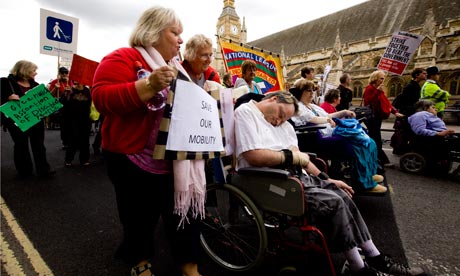George Osborne's plans to force disabled people into work will only create more hostility towards those who are already vulnerable

Disabled people protest against cuts in
their benefits, in Westminster in 2011.
Photograph: Martin Argles for the
Guardian
George
Osborne's workfare policy threatens to lump all claimants together, just as
Iain Duncan Smith's universal credit takes the same broad brush to those in need
of benefits. Of the 200,000 people who are long-term unemployed, how many sick
and disabled people will be forced to undertake community work, attend a
jobcentre every day or go on an intensive training programme?
The rally
in London on Saturday commemorating the 10,000-plus sick and disabled people
who have died since the Atos-administered work capability assessments began is a
straw in the wind. Figures from the Department for Work and Pensions show that
between January and November 2011 10,600
people died during, or within six weeks, of being put through the work
capability assessment (WCA). The WCA decides people's entitlement to benefit
based on a tick-box system that is unable to assess complex impairments and
mental health issues. According to the British Medical Association 40% of
assessments are overturned on appeal, rising to 70% for those who manage to get
legal representation.
OK, maybe the Tories have got a point, you think. All of these people on benefits – it can't be good for the economy, can it? Surely the sick and disabled should be encouraged to work? Surely simplifying benefits and treating all claimants the same will save the taxpayer millions? But at what cost?
Last week saw the
grotesque "mental
patient" Halloween costumes go on sale at Asda and Tesco, then their rapid
withdrawal after an outcry on social media. Perhaps Jack Dee
summed up the outrage and incredulity felt by the "mental patients"
themselves: "Just bought my Halloween costume. Going as managing director of
Asda." All of this takes place against increasing hostility towards the sick and
disabled: 1,942
disability hate crimes were recorded by police forces in England, Wales and
Northern Ireland one year after the coalition started governing "in the
national interest", and disability hate crime has doubled since the start of the
financial crisis.
And then there's Eric
Pickles. The communities and local government minister has been caught
on tape telling his constituent Teresa Cooper to "adjust your medication".
Cooper claims she was abused at the Kendall House care home in Kent in the late
1970s and early 1980s. Is Pickles qualified to pronounce on medication?
I'm reminded of Margaret Thatcher's speech to the 1922 Committee as the miners' strike escalated. "We had to fight the enemy without in the Falklands. We always have to be aware of the enemy within, which is much more difficult to fight and more dangerous to liberty." As the Tories commemorate "Our Maggie" what about commemorating the 10,000 people Saturday's rally gathered to remember? Labour said last week, "We're better than this". The Conservatives seem to be saying, "We're better than you".
Guardian